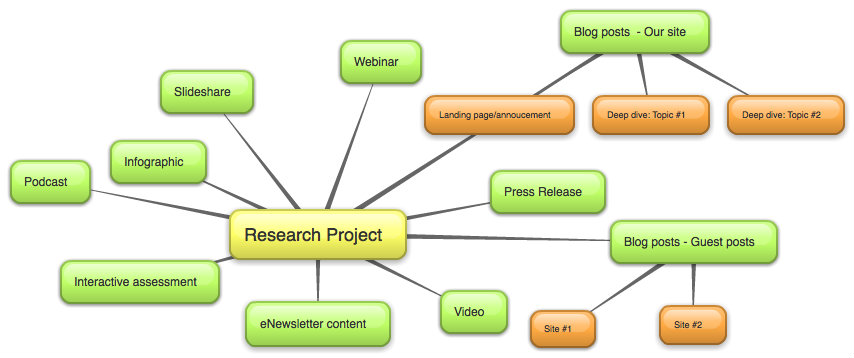If you are like any content marketer or writer I have met, you may have been challenged to consistently come up with new ideas. And, even when the ideas are flowing, how do you keep them organized — either by piece of content or by project? Both of these problems can take a huge amount of time and leave you spinning your wheels.
One approach I have been using to generate ideas and keep them organized is mind mapping. Mind mapping is a way to visually diagram your ideas around a topic or theme. The ways that you can use mind maps are endless, but here are some examples specific to content marketing.
Blogging
Because blogging requires a steady flow of new content, it can be tough to crank out ideas week after week. Mind mapping can be a great way to brainstorm.
Here is a very basic mind map I developed about blog posts by type. For instance, at CMI we publish several kinds of how-to posts: traditional step-by-step instructions/lists, interviews, research, case studies, and more. By breaking out post ideas by type (green bubbles), you may get inspired with different ideas (orange bubbles), and you can see where you have gaps in content. As you see below, you can also create related content, such as what we did with our report of the Brandpoint/CMI Digital Content Marketing survey and the follow up post that looked at how brands and agencies differ (blue bubble).

Another way you can use mind mapping for blogging is by looking at the posts by topic. In the very simple mind map below, the main topic I brainstormed on is Blog Posts (yellow bubble). All the bubbles in green represent the different categories we have for blog posts. And the orange bubbles are the various ideas I had for potential topics, authors, or existing assets that can be leveraged/promoted through posts. I’m always amazed by how many more ideas I get when I look at the information visually.
Outlines for content
You can also use mind maps to prepare outlines for any kind of content you are working on, such as eBooks, white papers, videos, and more. It can be useful to develop outlines via mindmaps instead of jotting ideas on paper or in Word because ideas seem more fluid and you may see opportunities on how to rearrange content to make things flow better.
Below is an example of a partial outline for the recent Ultimate Guide to Blogging eBook we recently developed. The yellow bubble is the name of the piece of content, and the green bubbles are the main sections of the eBook. The orange bubbles are a breakdown of specific ideas in each section.
As a note, you can also outline each blog post from the mind maps in the blogging example above.
Checklists and templates
Several weeks ago, I started thinking how to improve and systematize the way we distribute our content at CMI. While I ultimately developed a template that serves as my checklist, this idea started out as a mind map. As you can see, the green bubbles are the main channels we use for distribution, and the orange bubbles provide specific details for each channel as needed. I simply jotted down ideas and then translated it into a Word doc to make it easier for me to follow and share. Many mind mapping apps have a quick way to create outlines, so you don’t need to recreate your text.
Repurposing content
As you have heard time and again, it’s necessary to reimagine your content in many forms to be efficient and address the various ways people like to consume content. Taking a cue from Tom Pisello’s post on 23 Ways to Leverage a Blog Post for Content Marketing Success, I created this mind map. The green bubbles represent the various ways that research can be used, and the orange bubbles provide specific topics if a breakdown is needed.
Other mind maps
If you are looking for other ideas on mind maps, check out these sites and posts:
- CMI consultant Ardath Albee has a great example of a mind map for visualizing content flows based on buyer personas.
- Dana VanDenHeuvel created a mind map of one of my favorite marketing plans: Russell Sparkman’s 1-7-30-4-2-1 content marketing publishing schedule.
- Biggerplate has a library of mind maps specific to marketing.
While the mind maps above were created with bubbl.us, there are a lot of options available that I am trying. If you use mind mapping, what do you use it for? What is your favorite app? I’ll be doing a follow-up post in a few weeks that looks at various options, so I’d love to hear about your favorites.
Want more content marketing inspiration? Download our ultimate eBook with 100 content marketing examples.




